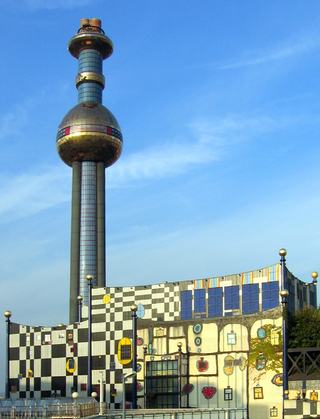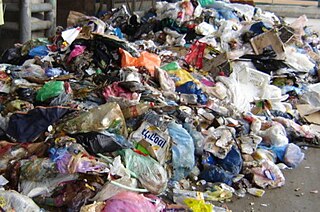
Waste management or waste disposal includes the processes and actions required to manage waste from its inception to its final disposal. This includes the collection, transport, treatment, and disposal of waste, together with monitoring and regulation of the waste management process and waste-related laws, technologies, and economic mechanisms.

Incineration is a waste treatment process that involves the combustion of substances contained in waste materials. Industrial plants for waste incineration are commonly referred to as waste-to-energy facilities. Incineration and other high-temperature waste treatment systems are described as "thermal treatment". Incineration of waste materials converts the waste into ash, flue gas and heat. The ash is mostly formed by the inorganic constituents of the waste and may take the form of solid lumps or particulates carried by the flue gas. The flue gases must be cleaned of gaseous and particulate pollutants before they are dispersed into the atmosphere. In some cases, the heat that is generated by incineration can be used to generate electric power.

Municipal solid waste (MSW), commonly known as trash or garbage in the United States and rubbish in Britain, is a waste type consisting of everyday items that are discarded by the public. "Garbage" can also refer specifically to food waste, as in a garbage disposal; the two are sometimes collected separately. In the European Union, the semantic definition is 'mixed municipal waste,' given waste code 20 03 01 in the European Waste Catalog. Although the waste may originate from a number of sources that has nothing to do with a municipality, the traditional role of municipalities in collecting and managing these kinds of waste have produced the particular etymology 'municipal.'
Pay as you throw (PAYT) is a usage-pricing model for disposing of municipal solid waste. Users are charged a rate based on how much waste they present for collection to the municipality or local authority.
EcoPark located in Tuen Mun Area 38, on west side of Hong Kong, is similar to an industrial park exclusively for waste recycling and environmental engineering. This is the first of its kind in Hong Kong.

Environmental Protection Department (EPD) is a department of Hong Kong Government concerning the issues of environmental protection in Hong Kong.The EPD is responsible for developing policies covering environmental protection, nature conservation; enforcing environmental legislation; monitoring environmental quality; providing collection, transfer, treatment and disposal facilities for many types of waste; advising on the environmental implications of town planning and new policies; handling pollution complaints and incidents; and raising awareness and support in the community for environmental initiatives.

Waste-to-energy (WtE) or energy-from-waste (EfW) is the process of generating energy in the form of electricity and/or heat from the primary treatment of waste, or the processing of waste into a fuel source. WtE is a form of energy recovery. Most WtE processes generate electricity and/or heat directly through combustion, or produce a combustible fuel commodity, such as methane, methanol, ethanol or synthetic fuels, often derived from the product syngas.
SITA is the main brand representing Suez's waste subsidiaries in Europe, North America, the Asia Pacific zone and Australia.
In the densely populated Hong Kong, waste is a complex issue. The territory generates around 6.4 million tons of waste each year but is able to collect and process only a minimal portion of recyclable waste. By 2019, its existing landfills are expected to be full. The government has introduced waste management schemes and is working to educate the public on the subject. On the commercial side, producers are taking up measures to reduce waste.
Waste management in Japan today emphasizes not just the efficient and sanitary collection of waste, but also reduction in waste produced and recycling of waste when possible. This has been influenced by its history, particularly periods of significant economic expansion, as well as its geography as a mountainous country with limited space for landfills. Important forms of waste disposal include incineration, recycling and, to a smaller extent, landfills and land reclamation. Although Japan has made progress since the 1990s in reducing waste produced and encouraging recycling, there is still further progress to be made in reducing reliance on incinerators and the garbage sent to landfills. Challenges also exist in the processing of electronic waste and debris left after natural disasters.
Solid waste policy in the United States is aimed at developing and implementing proper mechanisms to effectively manage solid waste. For solid waste policy to be effective, inputs should come from stakeholders, including citizens, businesses, community-based organizations, non-governmental organizations, government agencies, universities, and other research organizations. These inputs form the basis of policy frameworks that influence solid waste management decisions. In the United States, the Environmental Protection Agency (EPA) regulates household, industrial, manufacturing, and commercial solid and hazardous wastes under the 1976 Resource Conservation and Recovery Act (RCRA). Effective solid waste management is a cooperative effort involving federal, state, regional, and local entities. Thus, the RCRA's Solid Waste program section D encourages the environmental departments of each state to develop comprehensive plans to manage nonhazardous industrial and municipal solid waste.

Wong Kam-sing, GBS, JP, is a Hong Kong architect and the former Secretary for the Environment, Wong had held a number of public service positions before joining the Government, including the first Chairman of the Environment and Sustainable Development Committee of the Hong Kong Institute of Architects, the Chairman of the Professional Green Building Council and the Vice Chairman of the Hong Kong Green Building Council. He has contributed to the promotion and research of the standards and guidelines for sustainable built environment applicable to the high-density urban environment of Hong Kong.

Food waste recycling is a process to convert food waste into useful materials and products for achieving sustainability of the environment. Food waste is defined as all parts of food, inedible and edible, created before, during, and after food processing, production, and consumption. Greenhouse gases, especially methane can be reduced by food waste recycling. Food waste recycling can also alleviate the saturation of landfill sites in Hong Kong.

Taiwan has one of the most efficient recycling programs globally, with a 55% collection rate from households and businesses and a 77% collection rate from industrial waste in 2019. Taiwan’s high recycling rates are unattainable in most countries due to Taiwanese geographical advantages along with efficient waste processing technologies and systems.

The Hong Kong plastic shopping bag environmental levy scheme is an environmental levy scheme designed to reduce the manufacture and distribution of plastic shopping bags (PSBs) in Hong Kong. PSBs are made of materials that are not easily degradable. The extensive disposal of PSBs is putting stringent pressure on the very limited landfill capacity, thereby causing severe waste problems in Hong Kong.

Waste management in South Korea involves waste generation reduction and ensuring maximum recycling of the waste. This includes the appropriate treatment, transport, and disposal of the collected waste. South Korea's Waste Management Law was established in 1986, replacing the Environmental Protection Law (1963) and the Filth and Cleaning Law (1973). This new law aimed to reduce general waste under the waste hierarchy in South Korea. This Waste Management Law imposed a volume-based waste fee system, effective for waste produced by both household and industrial activities.

Waste management in Australia started to be implemented as a modern system by the second half of the 19th century, with its progresses driven by technological and sanitary advances. It is currently regulated at both federal and state level. The Commonwealth's Department of the Environment and Energy is responsible for the national legislative framework.

Environment and Ecology Bureau is one of the fifteen policy bureau of the Government of Hong Kong. The agency was established on 1 July 2022. The current Secretary for Environment and Ecology is Tse Chin-wan.
The Municipal Solid Waste Charging Scheme (Hong Kong), also known as the Waste Disposal (Charging for Municipal Solid Waste) (Amendment) Bill 2018, is a system for managing solid waste in Hong Kong. It implements legislation that takes effect on 1 April 2024. It adopts the 'polluter-pay' principle as first suggested by the government in 2005. It provides economic incentives for the general public to be aware of waste disposal volumes and reduce the waste they create by requiring individuals to purchase designated garbage bags or labels before disposing their trash. Waste reduction was seen as a way to delay expanding Municipal Solid Waste treatment facilities. Lessons were taken from experiences in cities such as Seoul and Taipei.










